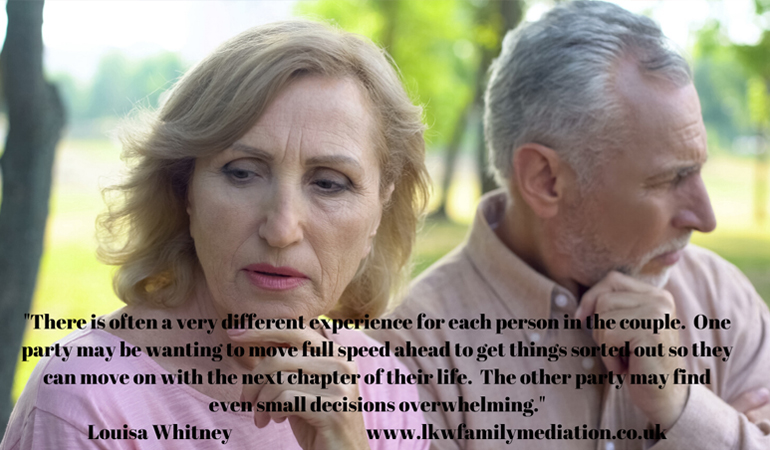When you first realise that your relationship has broken down there can often be a huge number of emotions that crop up. These might be:
• Guilt, regret, doubt
• Grief, anger, feeling bereft, sorrow
• Fear, anxiety
There may also be relief, and moments of joy or exhilaration, for some woven into the mix.
You may feel like you have a hundred questions in your head that you want to answer. Or you may feel that just getting up and managing to get your children to school is all you can manage today. There is often a very different experience for each person in the couple. One party may be wanting to move full speed ahead to get things sorted out so they can move on with the next chapter of their life. The other party may find even small decisions overwhelming. When faced with the person they thought they’d spend their life with pressuring them to ‘get on with things’ the reaction can be putting their head in the sand, deep despair, rage, or a combination of all three.
It is impossible for most people in the depths of such strong emotions to start to make informed decisions about what should happen next. They are not capable (on a brain functioning level) of taking in information, processing it and arriving at a decision. Interactions may be almost entirely led by the fact that they are in their fight or flight response. This can be very frustrating for the other person who may have been contemplating the end of their relationship for some time, and now that they have made the decision, and communicated their feelings, wants to be full speed ahead to a permanent separation and divorce.

It is managing this disconnect between the parties in the emotional healing process that can cause issues at an early stage. It’s important to be aware that there is a grief or healing process and that you may be at different points in it. This means you each have different functioning abilities, and needs right now. If you can be mindful of this then you are likely to fare better in the longer term – and your children almost certainly will.
Pushing a resolution when one party isn’t ready to contemplate it can ultimately result in a far more stressful, and resisted resolution. This is likely to take up more time, energy and money then giving the other person some space and starting the process when they feel more able to do so.
Getting support is also really crucial. This might be a friend to listen and to give you a hug. It might be asking family members to bring round meals, or look after your children, so you can reduce the caring demands being placed on you whilst you feel fragile. It might also include visiting your GP to assess whether you need any support. This support could be medication but equally it could be a talking therapy like counselling or CBT (Cognitive Behavioural Therapy) to help you manage anxiety. But there is no one size fits all and it helps to look at what would help you feel a little better, or a little more relaxed right now.
In due course there will be decisions to be made about money and about what arrangements will be of benefit for your children. If there are immediate financial issues then it can help to have a short term (bare minimum) plan and then look at a longer term plan once everybody feels more able.
It’s natural that divorce and separation brings money worries. For people making ends meet in one house (or maybe struggling to) how can you move to affording two homes?
Getting support can bring up concerns about money but remember that NHS support is free, as is assistance from friends and family.
You can also access a wealth of information online such as our blog. You can investigate having an initial meeting with a mediator or a lawyer to get information about processes and what you should be doing. You can also assess a range of resources designed to explain all the processes you might use to you and which you can go back to again and again, via our online shop. We have videos and workbooks to take you through the processes of resolving money and children issues step by step. There’s also a guided meditation to help with your stress levels.
Link you may find useful.
To find a lawyer or a mediator
Other blogs you may find useful:
The grief of divorce
Looking after yourself in a separation
If you’d like tips and support to help you manage your post separation arrangements then why not sign up to our free mailing list and get them direct to your inbox? You’ll get loads of tips along the way to help you mange your separation constructively too. You can also download our free top 5 tips to help you support your children during a separation.
We also have a separate list for for professionals working with separating couples. This includes resources for professionals to share with their clients and details of our forthcoming training workshops and networking events. Signing up also gets you a free PDF with our top 5 tips for getting more Dispute Resolution (DR) work. Even if you’re not trained in a DR process it gives you tips to get more rewarding work and to work in a less stressful way, whilst still helping those going through a separation.
If you’re a fan of social media then why not follow us there to get more of the things we share. If you feel able to share our posts so we can help more people then we’d be really grateful. You can find us on Facebook, Twitter,YouTube Pinterest. You can also find Louisa Whitney on Linkedin or Instagram.


One comment